Watts has announced an upcoming educational webinar titled Advancing Backflow Awareness to Safeguard Public Water, scheduled to air live on July 24, 2025, at 12 p.m. ET. The session is designed for professionals involved in backflow prevention and public water safety, including public drinking water officials and regulators, cross-connection control program managers, backflow testers and Read more
Industry News

Watts has announced an upcoming educational webinar titled Advancing Backflow Awareness to Safeguard Public Water, scheduled to air live on July 24, 2025, at 12 p.m. ET. The session is designed for professionals involved in backflow prevention and public water safety, including public drinking water officials and regulators, cross-connection control program managers, backflow testers and installers, and members of water utilities and industry associations.

The webinar will be led by Watts Regional Sales Manager Sara Hiers and will focus on the findings of a recent nationwide homeowner survey conducted by Watts. These results shed light on key gaps in public knowledge and offer actionable insights to help professionals strengthen education efforts and build greater support for backflow prevention programs.
Attendees will learn how to identify the challenges of communicating backflow risks to the public, understand current homeowner awareness levels, and apply strategies that effectively reach modern audiences. The session will also explore tools and communication channels that align with how today’s homeowners prefer to receive information.
Participants who attend the full webinar will receive a Certificate of Completion, which may be submitted for professional development hours. Acceptance is subject to individual state or organizational requirements.
To register for the webinar, visit watts.com/SafeguardPublicWaterWebinar.

Navien, Inc. proudly announces the availability of its highly anticipated NWP500 Series Heat Pump Water Heater. This next-generation, eco-friendly water heating solution is now ready to deliver outstanding efficiency, advanced connectivity, and ultra-quiet operation for residential applications across the USA and Canada. Building off the success of stainless steel materials in their number one selling Read more
Navien, Inc. proudly announces the availability of its highly anticipated NWP500 Series Heat Pump Water Heater. This next-generation, eco-friendly water heating solution is now ready to deliver outstanding efficiency, advanced connectivity, and ultra-quiet operation for residential applications across the USA and Canada.
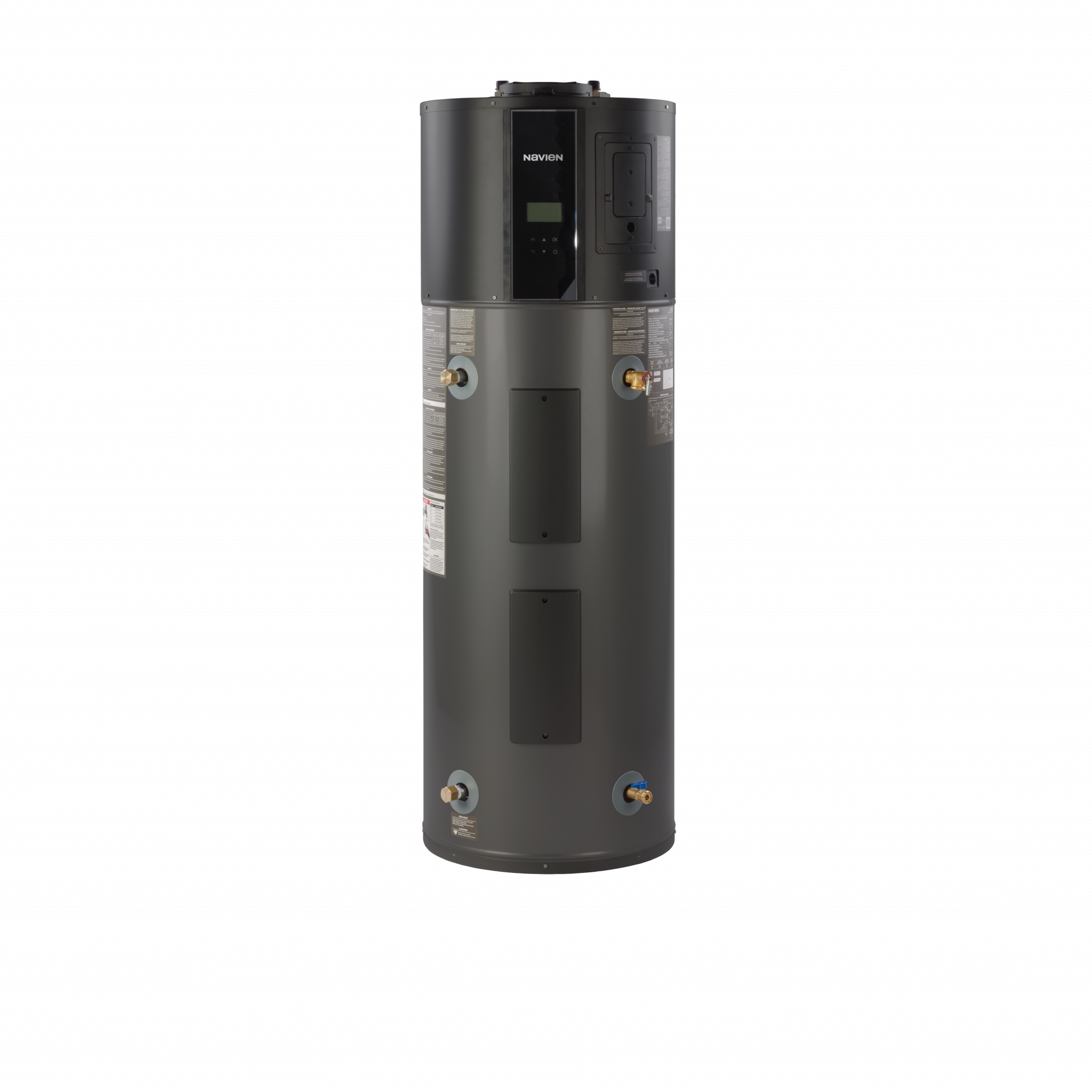
Building off the success of stainless steel materials in their number one selling tankless water heaters and boilers, the NWP500 Series features a durable stainless steel tank and coated aluminum coils, eliminating the need for interior anode protection while delivering long-lasting performance and enhanced corrosion resistance with reduced maintenance requirements over the life of the unit. The exterior of the NWP500 features an easy-to-clean, fingerprint- and smudge-resistant matte grey pre-coated finish for a premium look and feel that fits seamlessly into modern home environments. The NWP500’s lighter weight design and top and side connection options offer versatility and ease of installation in a variety of indoor settings.
“The launch of the NWP500 Series perfectly reflects Navien’s ongoing commitment to innovation and environmental responsibility,” said TH Kim, CEO at Navien. “We designed this product to not only deliver outstanding performance and convenience in everyday life, but also to contribute to a cleaner, more sustainable future for the communities we serve.”
Key features of the NWP500 Series Heat Pump Water Heater include:
- Exceptional Energy Efficiency: Energy Star® certified with Uniform Energy Factor (UEF) ratings up to 4.05.
- Easy-to-use LED Display: Intuitive control panel for adjusting temperature and settings.
- Advanced Connectivity: Built-in Wi-Fi powered by NaviLink® for remote monitoring, control, and over-the-air software updates.
- Demand Response Ready: Integrated EcoPort™ (CTA-2045 Port) ensures compatibility with utility demand response programs.
- Ultra-Quiet Operation: Operates at noise levels below 45dBA, making it one of the quietest heat pump water heaters in its class.
- Installer Friendly: Indoor installation with top and side connection options, dry-fire protection, and intuitive control panel with LED display.
- NEEA AWHS Tier 4 Compliant Design: Engineered to meet the most stringent regional efficiency standards.
- 5 Operation Modes: Energy Saver, Heat Pump, High Demand, Electric, and Vacation modes for maximum performance.
- Wide Operation Range: Ambient operation range as low as 41°F.
- Future-Ready Recirculation Support: Compatible with upcoming Navien recirculation pump accessory (late 2025).

All of these premium materials and innovative features that were engineered into the NWP500 earned the heat pump water heater the 2025 Red Dot Design Award, a globally recognized distinction that celebrates outstanding product design, innovation, and functionality. Available in three sizes – 50, 65, and 80 gallons – the series offers first-hour ratings from 65 to 85 gallons to meet various household demands.
For more information about the NWP500 Series Heat Pump Water Heater and Navien’s full line of advanced solutions, visit navieninc.com.

Oatey welcomed 15 Ambassadors to its premier Cleveland training facility for a multi-day immersive experience that combined hands-on learning, product innovation, community building, and more. Oatey Co., a leading manufacturer in the plumbing industry since 1916, recently hosted its fifth annual Ambassador Fest in Cleveland. This event marked the company’s largest plumbing influencer event to Read more
Oatey welcomed 15 Ambassadors to its premier Cleveland training facility for a multi-day immersive experience that combined hands-on learning, product innovation, community building, and more.
Oatey Co., a leading manufacturer in the plumbing industry since 1916, recently hosted its fifth annual Ambassador Fest in Cleveland. This event marked the company’s largest plumbing influencer event to date.
Ambassador Fest, an annual highlight of Oatey’s award-winning Ambassador Program, is a three-day experience focused on helping participants grow as skilled tradespeople and digital content creators. The event underscores Oatey’s commitment to the trades while empowering Ambassadors to influence the products and content shaping the plumbing industry directly.
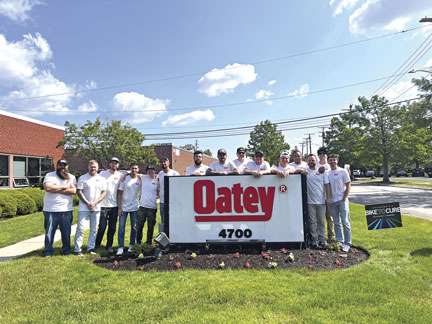
This year’s attendees included Tucker Baney, Nick Hotujec, Keith McGillivary, Leon Garrett, Zachary Emond, Jose Lopez, Alan Carlson, Mike Caruso, Grant Blundell, Rob Lupton, Shay Lorette, Thomas Young, Danielle Browne, Germaine Nelson, and Robert Broccolo. Collectively, they represented a diverse range of plumbing and building expertise from across North America.
“Held June 8–10 at the Oatey University training center, the event featured hands-on instruction, including Oatey’s industry-leading solvent welding training, where Ambassadors assembled their own solvent-welded joints. These were put to the test in the annual Burst Test Challenge, a tradition where Ambassadors compete to see whose assembly holds the most pressure. The agenda also included product deep-dives led by Oatey’s product and engineering teams, with each session giving the Ambassadors a platform to share feedback and insights from the field.
Beyond training, Ambassadors took guided tours of Oatey’s manufacturing and distribution facilities for an inside look at daily operations and the craftsmanship behind the product. They also received an exclusive preview of Oatey’s latest innovations during a Product Expo.
The experience concluded with the first-ever Oatey Amazing Race—a fast-paced, citywide scavenger hunt. Ambassadors tackled a series of plumbing and physical challenges across multiple locations, culminating in a relay-style toilet rebuild that showcased their teamwork, problem-solving and pride in the trade.
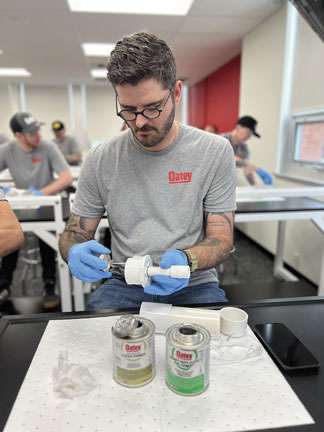
“Ambassador Fest is a celebration of partnership, passion and purpose,” says Katherine Lehtinen, Senior Vice President of Brand and Digital Marketing at Oatey. “It’s an honor to bring together such talented individuals who care deeply about their craft, while also learning from one another, championing the trades, and working together to strengthen the future of our industry.”
“Connecting with fellow Ambassadors in Cleveland gave me a real sense of camaraderie and pride in my profession,” said Zachary Emond, a first-year Oatey Ambassador based in Tulsa, Oklahoma. “From seeing how the products are made to giving feedback on what we use every day, the whole experience felt worthwhile. It’s not every day you get to make a lasting impact on the trade alongside a company that genuinely values your perspective.”
For additional information about Oatey’s Ambassador Program, visit oatey.com.

‘Foolproof Pocket Tech’ for Pipe Rehab and Replacement Professionals The newly released HammerHead OnSite app assures cured-in-place pipe (CIPP) as well as pipe bursting professionals have precisely everything they need for an installation, even dry materials. The app features a tool string builder for pipe bursting applications.Sarah Newman is Associate Manager, Education & Training for HammerHead Trenchless Read more
‘Foolproof Pocket Tech’ for Pipe Rehab and Replacement Professionals
The newly released HammerHead OnSite app assures cured-in-place pipe (CIPP) as well as pipe bursting professionals have precisely everything they need for an installation, even dry materials. The app features a tool string builder for pipe bursting applications.
Sarah Newman is Associate Manager, Education & Training for HammerHead Trenchless. “We wanted to give customers a single digital source for selecting and calculating the consumables they need for their projects,” she said. “It’s pocket tech they can use to accurately spec out everything they need right on the jobsite.”
“These are the biggest updates ever made to the app,” said HammerHead Application Specialist Bobby Anderson, who will be training customers on the app. “It’s not just more user-friendly than before but forgiving, practically foolproof,” Anderson said. The app’s automated calculations significantly reduce the potential for human error. “That brings peace of mind, takes away anxiety and stress from hoping you’re not cutting yourself short yet aren’t buying way more than you need.”
Cured-in-place-pipe (CIPP) installers proceed through a short list of prompts: type of curing system such as hot water, ambient or Bluelight LED; diameter and length of host pipe; and distance between drum nozzle and host pipe, Anderson said. “It even accounts for transitions, one size pipe to another.” Users can convert from standard (imperial) to metric with a single click.
The user is then given a diagram of the required liner and resin weight, length of calibration tube and liner, and the roller gap setting to use for ideal liner saturation during wet out.
The app has also streamlined the ordering process. Selected items are placed into the user’s shopping cart right from the app. When they login into their personal store account as usual, they can securely complete their purchase.
Additional quick-link features take the user through to HammerHead University Online, instructional videos, product and application guides, warranty literature and more.
The app even includes a job logging feature that enables users to make notes and observations of their jobs for future reference, including all job metrics and lot numbers for warranty purposes.
The HammerHead Onsite mobile app from HammerHead Trenchless is created for use with HammerHead CIPP and Point Repair systems, Picote™ Coating systems, and all HammerHead bursting systems. It is available for both Android and Apple devices from the Google Play Store and the App Store.
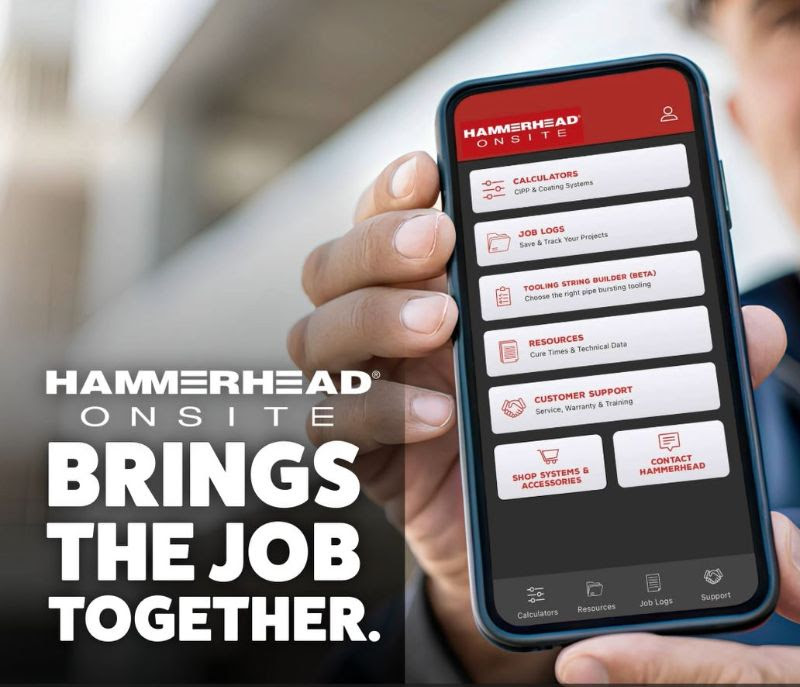

A. O. Smith, a leader in water heating and water treatment products, has launched its highly anticipated Summer Tools promotion. The promotion is available to valued wholesale channel partners and their customers during the summer months. The promotion began July 1 and runs through Aug. 31, 2025. During this window, contractors will have the opportunity Read more
A. O. Smith, a leader in water heating and water treatment products, has launched its highly anticipated Summer Tools promotion. The promotion is available to valued wholesale channel partners and their customers during the summer months.
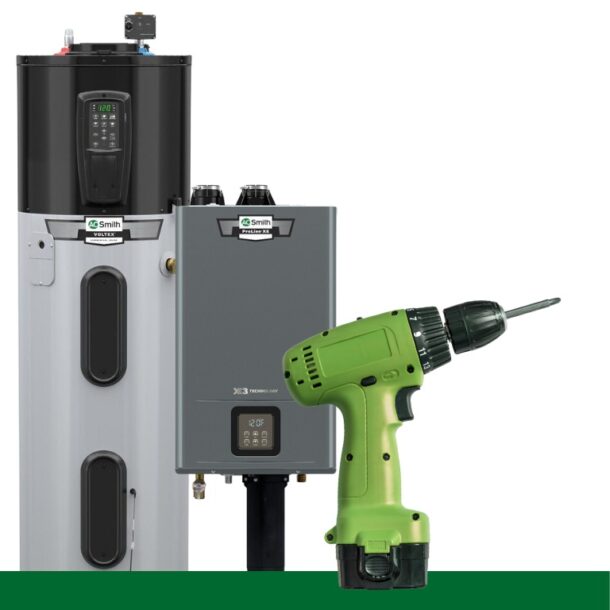
The promotion began July 1 and runs through Aug. 31, 2025. During this window, contractors will have the opportunity to receive a $100 parts/supplies credit when purchasing two A. O. Smith heat pump water heaters and/or gas tankless water heaters from participating wholesale partners while supplies last*.
“There’s a lot of interest around our seasonal promotions, and we’re excited to extend that into the summer months,” said Betsy Curran, North America Water Heating director of marketing and customer engagement. “These promotions allow us to further connect with our wholesale partners and existing A. O. Smith customers while also introducing our products to new professionals.”
For full promotion details and a list of participating wholesalers, visit www.hotwater.com/summer25promo.html.
